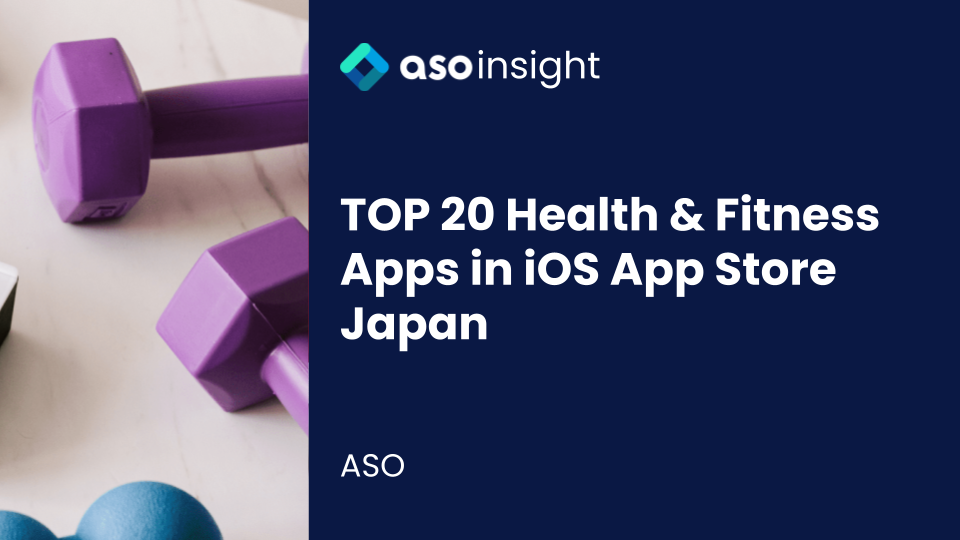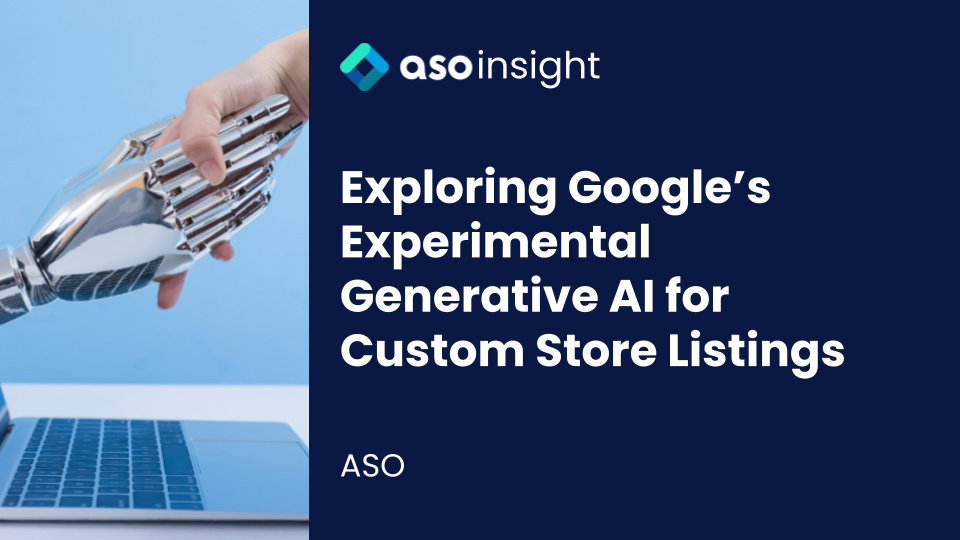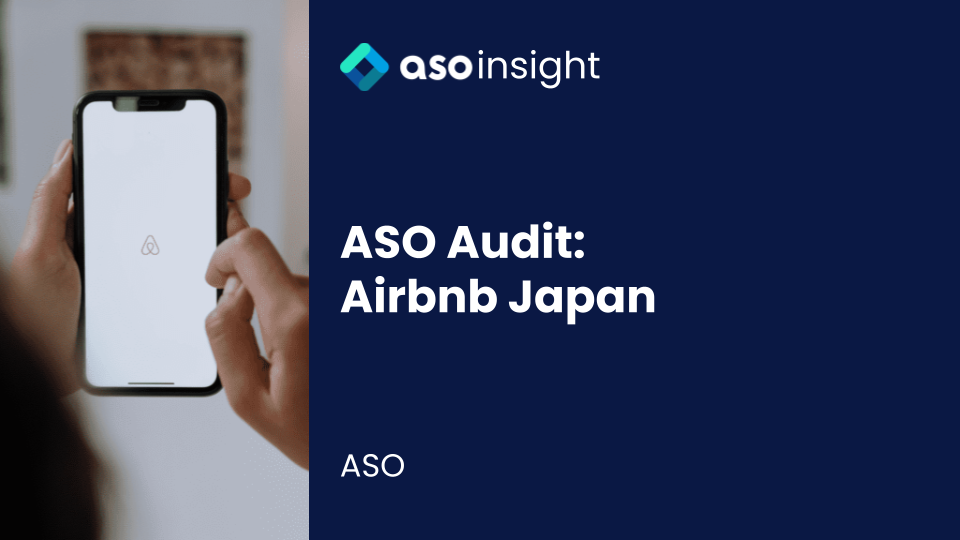Intro
Google has launched a new update on its search system, called “Helpful Content.” As Google is the world’s largest search portal that transfers 5.6 billion searches per day, so the newly-added search system tweak is something creators have to make a note of it and prepare for change. After the update is made, it passed about two weeks, so it should have been completely adapted to the Google search engine as Google deemed so. This article then aims to recap what kind of changes are made with “Helpful Content” update, what has been affected since the update, and whether how optimization in Play Store has been affected.
Google’s Helpful Content aims to determine low-quality content which does not provide meaningful or valuable information for searchers. Thus, a website that is mainly constituted with poor quality content will be ranked lower on the search, while websites with high-quality content will be positioned higher. Then, what Google defines as low-quality content? Google considers any content that focuses on SEO before its target searchers as low-quality content. SEO-focused content is usually generated by AI tools that automatically create content that is written with relevant keywords and at an appropriate length. These bot-generated articles are known to aid in increasing SERP (Search Engine Result Page) rankings, and Google attempts to sort these out because they do not provide valuable information.
Google also announced that Helpful Content is a new signal, run by a machine-learning model, to rank web pages, and it will affect English only. Applying this change to other languages may take time, but Google has noted that the company’s priority is to provide meaningful content to its users, so it is likely that it will be applied to other languages in near future.
In a nutshell, Helpful Content is a new search tweak that can sorts out bot-generated content which only aims to help SERP rankings, and this determination will be made by a machine-learned algorithm, rather than human reviews.
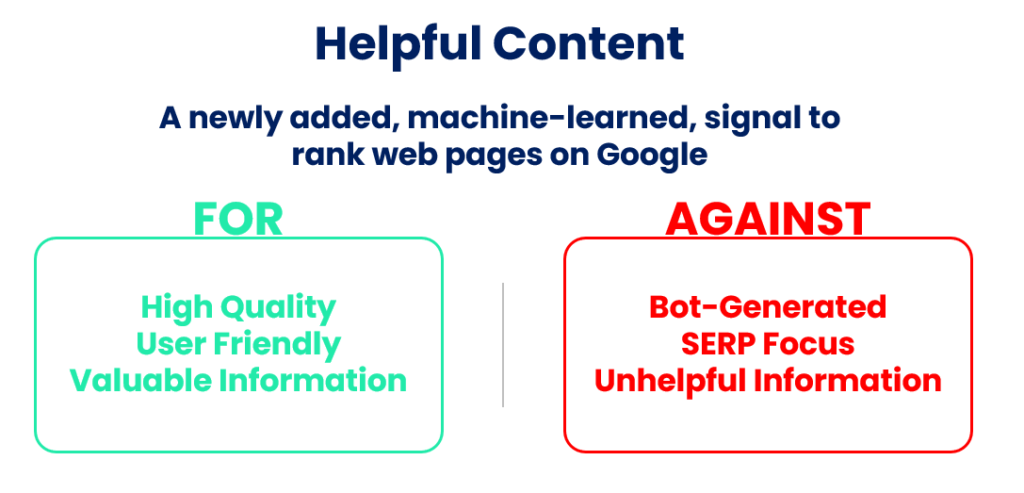
What Has Been Changed since the Update?
Since the update has been announced, it has passed about two weeks. So far, there hasn’t been significant news or damage report due to the update. It still may have affected some creators and website managers if the majority of their content could be determined as low-quality, and they also might have to hire a writer to produce content. Perhaps, the content-generating tools are on the way to improvement toward figuring out how Helpful Content tweak works and including a logic that allows the production of high-quality and user-first content.
However, it is never an easy task to discover how the search algorithm works; one can merely make a supposition. And to make this supposition believable, it takes time and repeated tests. Yet it is a risky attempt since the new algorithm tweak may determine such an attempt as SERP-first, thus low-quality. Thus, the safest action at the moment will be listening to Google: “Search is a complicated and evolving art and science, so rather than focusing on specific algorithmic tweaks, we encourage you to focus on delivering the best possible experience for users.” (Reference: Google Search Central)
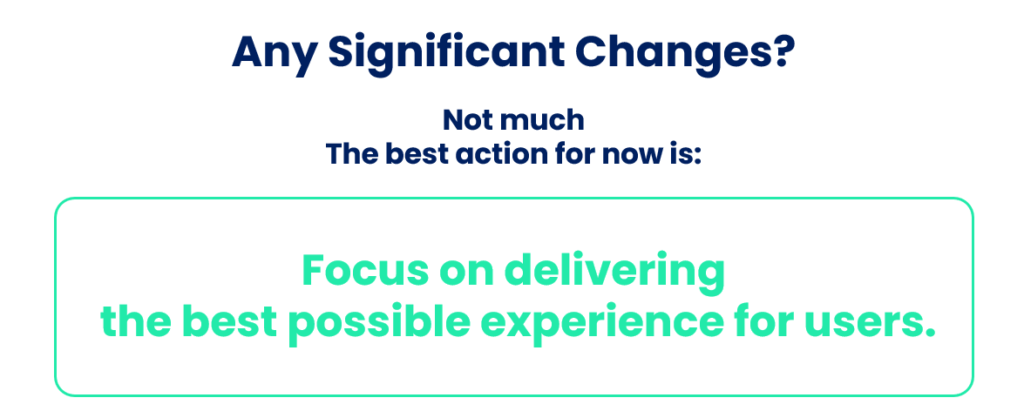
Reference: Google Search Central
How About Search on Play Store?
The Helpful Content update is a new signal that determines the rankings of web pages on Google. Yet what does this have to do with Play Store? Does it affect how search ranking is determined on Play Store as well? Google hasn’t made a clear point on this. Play Store has more various criteria than the Google browser, such as the number of downloads and review ratings, so its ranking determination system would not be affected so much right away. Yet it is highly likely that Play Store may also go through a change in the same direction as Google addressed that its priority concern is “to better connect people to helpful information” (Reference: Google Search Central). So it is important for app developers and ASO experts to understand what should be prepared for the future changes Google is likely to implement.
1. Avoid Repeated Keywords
Even though it is an already known tip in successful ASO, the importance of avoiding repeated keywords seems increased. Google may update the Play Store search in a way that it counts apps that have keywords that are repeated too often and too many times as ASO-focused, thus low-quality. So it is advisable to not use the same keywords in the app’s metadata, especially in its title and short description, for these two are more easily seen by users and seem to have more weight than the app’s full description.
2. Be Careful with Paraphrases
Another piece of advice is not to paraphrase an app’s metadata too often. It is especially tempting to paraphrase when composing the full description since there is plenty of space to try out various keywords that mean similar to the ones used in the title and short description. It is the right direction from ASO’s standpoint, yet Google may become able to determine frequent paraphrasing as unnecessary keyword repetitions, rather than an act of sound ASO or a production of user-friendly information. Thus, it seems reasonable to fill the full description with the app’s features and benefits, and then manage the keywords from there.
3. Always Use Actual UI/UX in Creatives
This is also another well-known ASO tip that the app’s creatives should show the actual UI/UX. Yet this is as important as ever before, knowing that Google’s direction goes toward user-first and valuable information. Any apps that show creatives that are deliberately edited to only present what draws users’ attention, rather than actual UI/UX, will earn less and less credit in Play Store. It’s becoming more important than ever to show what the app does so that it can be used by users who need it, rather than attempting to gain users fastly by choosing expedient ways.
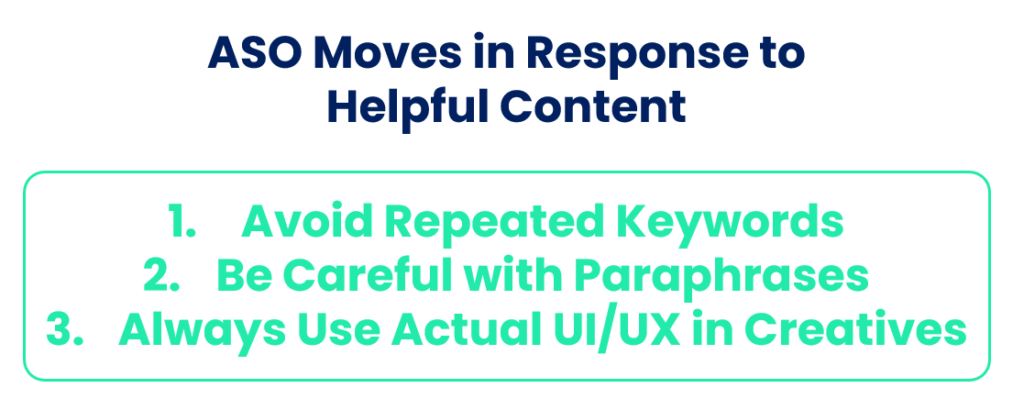
Conclusion
The Helpful Content update on Google search can be a ground-shaking change for some creators. Yet the direction that Google is taking is not complicated at all. What creators need to remember is one thing: Focus on the essentials of the app and show off how good it is to your users. Having this point always in mind, it will naturally reflect what is valuable and meaningful to users. That is the most essential starting point, and then the optimization can take place to let it fully blossom to its potential.



